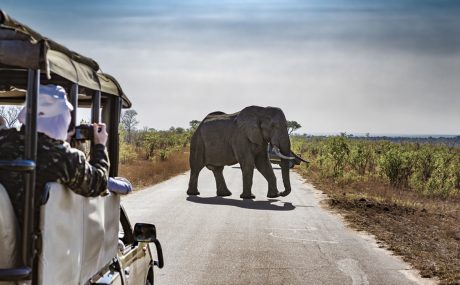Background
On 22 October 2011, a Canadian couple and their 2 young children, arrived in Zambia at a luxury safari lodge, for their first safari experience. That evening the chief guide and manager, invited them along on a walk which he had arranged in the morning for his brother’s children to see the small flora and fauna in the vicinity of the lodge.
They departed at 6 am, led by the chief guide. At no stage were they warned that they might have a close encounter with big game.
Over an hour into the walk, having gone much further than they anticipated, an adult female elephant was spotted ahead, with a calf elephant separated from her and to their right. Despite this the guide led them towards the female elephant and took cover behind a tree. This was seen as an aggressive act by the female elephant who then made a number of mock charges.
The armed scout accompanying the walk cocked his rifle several times in an unsuccessful attempt to scare off the elephant, but he did not fire.
The guide then told the group to “run”, but without telling them where to go and leaving the cover of the tree.
Our clients’ son ran in a different direction to most of the group, his mother followed to protect him and she was then attacked by the female elephant. She sustained life threatening injuries, notably a very large wound to her abdomen, which necessitated a long inpatient stay, several operations and the likelihood of further major abdominal surgery in the future to try to stop the wound deteriorating.
Our clients initially attempted to resolve their claim with the Zambian Safari Lodge in South Africa. However, they became frustrated by the slow progress, so in November 2013 they instructed Stewarts who commenced a detailed evidence gathering exercise including reports from a safari expert, expert in Zambian law, general surgeon, psychiatrist and a physiotherapy/rehabilitation consultant.
High Court Proceedings were issued in London in May of 2014 and served upon the chief guide who was an English resident.
The companies who owned and ran the safari lodge challenged the jurisdiction of the English Courts, but at a settlement meeting in October 2014 they agreed to pay compensation of £2.5 million to our clients.
This is believed to be the highest personal injury settlement award for a claim pursuant to Zambian law.
Julian Chamberlayne, Head of International injury at Stewarts:
“This claim had significant complications due to the nature of the incident, the international features of the dispute and because our client’s injuries were unusual with severe lifelong effects which were difficult to predict.
Had this claim been issued in either Zambia or South Africa, with all the inconvenience the clients wished to avoid, I suspect the best they would have recovered would have been a small fraction of the amount they have now received.
I was also pleased that we were able to resolve this complex dispute on such good terms within a year of instruction”.
Stewarts’ clients commented that:
“Julian and his highly qualified and always available team gave us the confidence we needed to continue with this long and frustrating legal battle, put a strategy in place and set the goal, meticulously advanced our case and devoted all efforts required to make our wish happen within the timescale we had given him from the outset. We could not have found better representation.”
You can find further information regarding our expertise, experience and team on our International Injury pages.
If you require assistance from our team, please contact us or alternatively request a call back from one of our lawyers by submitting this form.
Media contact: Lydia Buckingham, Senior Marketing Executive, +44 (0) 20 7822 8134, lbuckingham@stewartslaw.com


